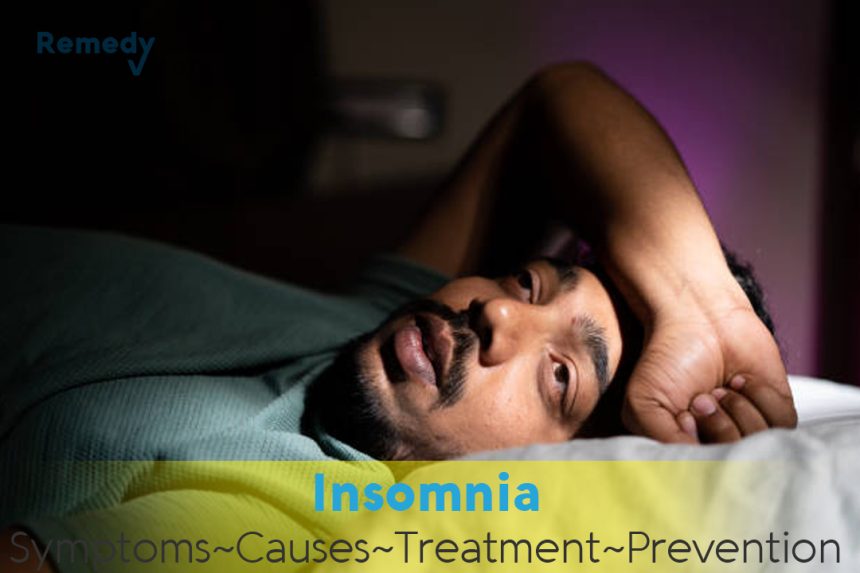What is it
An estimated 20 to 40 percent of all adults complain about insomnia a general term that refers to difficulty falling or staying asleep. Insomnia is not really a disorder but a symptom with many causes. For example, temporary insomnia can be caused by jet lag, which upsets the body’s biological clock, or by some specific, stressful situation like a divorce or change in job. Once these situations have been resolved, sleep returns to normal.
How alert and refreshed you feel, rather than how many hours of sleep you get, is a better sign of whether insomnia is a problem for you. Not everyone needs eight hours the number often used as the benchmark for a good night’s sleep. Some people feel well rested after only six hours of sleep a night though recent research suggests that others who think they are doing fine on five or six hours would actually benefit from more sleep.
Age is a key factor in assessing insomnia. It’s a sign of troubled sleep if a child or young adult has difficulty falling asleep or wakes up repeatedly. But in about 80 percent of people over the age of 60, sleep becomes more fragmented. People in this age group tend to wake up more often (and for longer periods) during the night, and earlier in the morning, with generally less deep sleep and more light sleep.
Symptoms
- Difficulty falling asleep.
- Fragmented sleep waking frequently during the night or waking earlier than desired.
- Fatigue, drowsiness, inability to concentrate, and mood shifts all of which can result from insomnia.
What causes it
Persistent insomnia can be difficult to diagnose. The Association of Sleep Disorders Centers has suggested causes ranging from psychological and medical conditions to environmental factors like noise and room temperature. Many studies have been done to determine if personality traits make one a good or poor sleeper. Some researchers found that poor sleepers are more anxious, depressed, and introspective, but other studies have found that personality is not a factor.
Many experts are convinced that in the majority of cases the original cause becomes secondary; instead, the insomnia persists because of behavioral factors that reinforce it, such as excessive time in bed, drug dependency, and napping. Also, the harder you try to fall asleep, the more anxious you become, which makes success all the more difficult.
What if you do nothing
Occasional insomnia is nothing to worry about. The notion that we all need eight hours of sleep a night or any other fixed amount has been disproved. A good night’s sleep is what ever-allows you to feel refreshed, alert, and in good spirits the next day, and there are wide individual differences in how much sleep people need to achieve that goal. Some need 9 or 10 hours, others only six.
Also, don’t worry that you have to “make up” every hour of lost sleep. One good night will usually repair the fatigue.
Home remedies
Before you reach for sleeping medications, try the following self-help measures. Several studies have shown that in many, if not most, instances of insomnia, such steps are more effective at treating the problem than prescription sleeping pills.
Try to correct what’s bothering you
If your sleeplessness arises from worry or grief. If you can’t do anything about the situation right away, try confiding in a friend, joining a support group, or finding a qualified counselor.
Don’t consume alcohol just before bedtime and don’t smoke
Alcohol can disturb sleep patterns and make insomnia inferior. Nicotine makes you restless, too.
Avoid eating a heavy meal in the evening particularly at bedtime
Don’t drink large amounts of liquids before retiring.
Eliminate caffeinated beverages
Except in the morning or early afternoon.
Unless you’re older, try to avoid daytime naps even when you’re tired
It’s all right to use a nap for catching up on occasional lost sleep, but naps shouldn’t become a substitute for sleep. Naps probably can be beneficial for older people whose sleep is fragmented—and certainly it’s better to nap than to rely on sleeping pills.
Spend an hour or more relaxing before you retire
Read, listen to music, watch TV, or take a warm bath.
Go to bed and get up on a regular schedule
No matter how much you haven’t slept.
Get up and do something
Don’t just lie there trying to fall asleep; if you’ve gotten into bed and after 20 minutes still can’t sleep, get up. But if you get up to work, don’t bring the work to bed: keep work and sleep separate. If you wake up in the middle of the night and can’t fall asleep, try reading for a short time. Counting sheep (or flowers or whatever appeals to you) or reconstructing a happy event or narrative in your mind may lull you to sleep.
Prevention
The measures described above will also help prevent insomnia. In addition, try to avoid taking sleeping pills. In a study reported in the American Journal of Psychiatry one group of insomniacs was treated with the prescription sleeping pill Halcion, while another learned to do some muscle relaxation exercises and to follow the kind of advice outlined above. At first, the Halcion group got more sleep, but by the second week the other group had caught up. By the fifth week the members of the behavior training group were falling asleep faster and sleeping better than the Halcion group.







